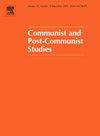共产党政权领导人的民主诉求
IF 1.3
4区 社会学
Q3 INTERNATIONAL RELATIONS
引用次数: 1
摘要
诞生于革命的共产主义独裁政权声称他们的统治是民主的,他们支持选举,即使没有竞争,但如果选举结果让得票最多的人获得高位,而让得票较少的人边缘化,这可能会补充他们的统治主张。2018年,古巴新任总统认为,2018年的选举民主地塑造了新的国民议会和国务委员会:获得了选民的支持,并在性别、种族和年龄方面实现了更好的包容性。事实上,在2003年、2013年和2018年的选举中,该委员会在人口统计学上变得具有包容性,赶上或超过了东亚的共产主义政权同行。然而,在古巴和在越南一样,选举投票份额对安理会成员资格影响不大;得票最多的人没有得到奖励,得票较低的人也没有被排除在外。本文章由计算机程序翻译,如有差异,请以英文原文为准。
The Democratic Claims of Communist Regime Leaders
Communist authoritarian regimes born of revolution claim that their rule is democratic, sponsoring elections that, even if uncompetitive, may supplement their claims to rule if the outcome rewards the most-voted with high posts and sidelines the lower-voted. In 2018, Cuba’s new president argued that the 2018 election shaped the new National Assembly and Council of State democratically: garnering electoral support and better inclusiveness by gender, race, and age. Indeed, across the 2003, 2013, and 2018 elections, the Council became demographically inclusive, matching or exceeding its East Asian communist regime peers. However, in Cuba as in Vietnam, election vote shares had little effect on Council membership; the most-voted were not rewarded, the lower-voted were not sidelined.
求助全文
通过发布文献求助,成功后即可免费获取论文全文。
去求助
来源期刊

Communist and Post-Communist Studies
Multiple-
CiteScore
1.90
自引率
0.00%
发文量
23
期刊介绍:
Communist and Post-Communist Studies is an international journal covering all communist and post-communist states and communist movements, including both their domestic policies and their international relations. It is focused on the analysis of historical as well as current developments in the communist and post-communist world, including ideology, economy and society. It also aims to provide comparative foci on a given subject by inviting comments of a comparative character from scholars specializing in the same subject matter but in different countries.
 求助内容:
求助内容: 应助结果提醒方式:
应助结果提醒方式:


